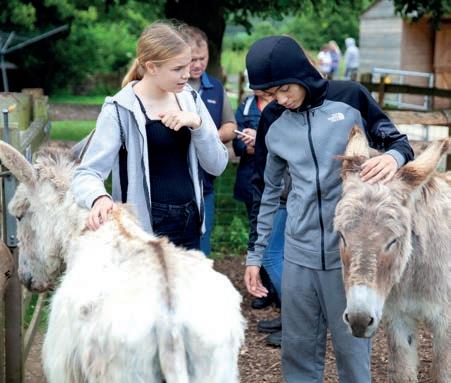
2 minute read
Representing your interests
Representing yourinterests
Senior Land Use Policy Adviser Graham Clark outlines the breadth of work the CLA has undertaken to represent woodland owning interests
ast year was a busy one
Lfor forestry and woodland. With climate change driving unprecedented interest in trees, and major policy developments either announced or initiated in both
England and Wales, the CLA has been representing woodland-owning interests.
We were pleased to see several CLA
‘asks’ re ected in the England Trees Action
Plan and England Woodland Creation
Off er (EWCO) grant scheme. The CLA helped shape Defra’s thinking on this long before it was consulted on, and we were pleased that our recommended ‘payment for public benefi ts’ model was adopted for the scheme. We also welcomed the signifi cant additional government money for the Nature for Climate Fund, which funds woodland and peatlands up to 2025 and was announced in the government’s Net Zero Strategy.
Governments in London and Cardiff must make it easier and more attractive to create woodland if we’re to see more of it. EWCO is certainly a more attractive off er, with higher capital payments, supplements for providing specifi ed public goods and the previously separate maintenance payments now part of a single process. We also secured a guarantee that those who moved early to plant trees would not be disadvantaged when Environmental Land Management (ELM) schemes appear in 2024. This reassures landowners in England that there is no benefi t to delaying planting in the hope that future schemes will be better. Clarity on ELM is still largely lacking, although our ask that farm woodland management be included in the Sustainable Farming Incentive pilot has been incorporated.
Overall, despite several policy announcements during 2021, there has been less tangible progress on improving the woodland ‘off er’ for landowners in Wales. The climate change minister issued a ‘call to arms’ on Welsh tree planting in the summer, and the CLA promoted the National Forest and The Woodland Investment Grant, but we cautioned members that any woodlands grant aided through it had to allow public access. CLA Cymru responded to the Agriculture (Wales) Bill consultation in February, but a draft Sustainable Farming Scheme and an improved woodland creation scheme built on previous Glastir programmes will be launched in 2022.
Even the pandemic didn’t stop our forestry and woodland committee meetings to discuss sectoral issues, and we held them virtually in 2021. We were joined in May by Defra directors to outline the department’s Trees Action Plan and take questions. In February, we heard from the chair of an industry and government group investigating ash dieback and road closures. The report is being used to lobby for better coordination and more resources to tackle the issue.
The CLA’s sectoral links and liaison with Defra have borne fruit. Support is now off ered in Defra’s Tree Health Pilot to help groups of landowners in England pay for road closures needed to deal with roadside ash. When the pilot was launched in September, we called on Welsh Government to provide similar support to help deal with the problem of ash dieback.
Top-level in uence continued throughout 2021, with our president, the CLA director of policy and advice and the CLA Cymru director meeting with the relevant secretaries of state in government, the Forestry Commission chair, the EFRA Committee and Welsh government ministers.












